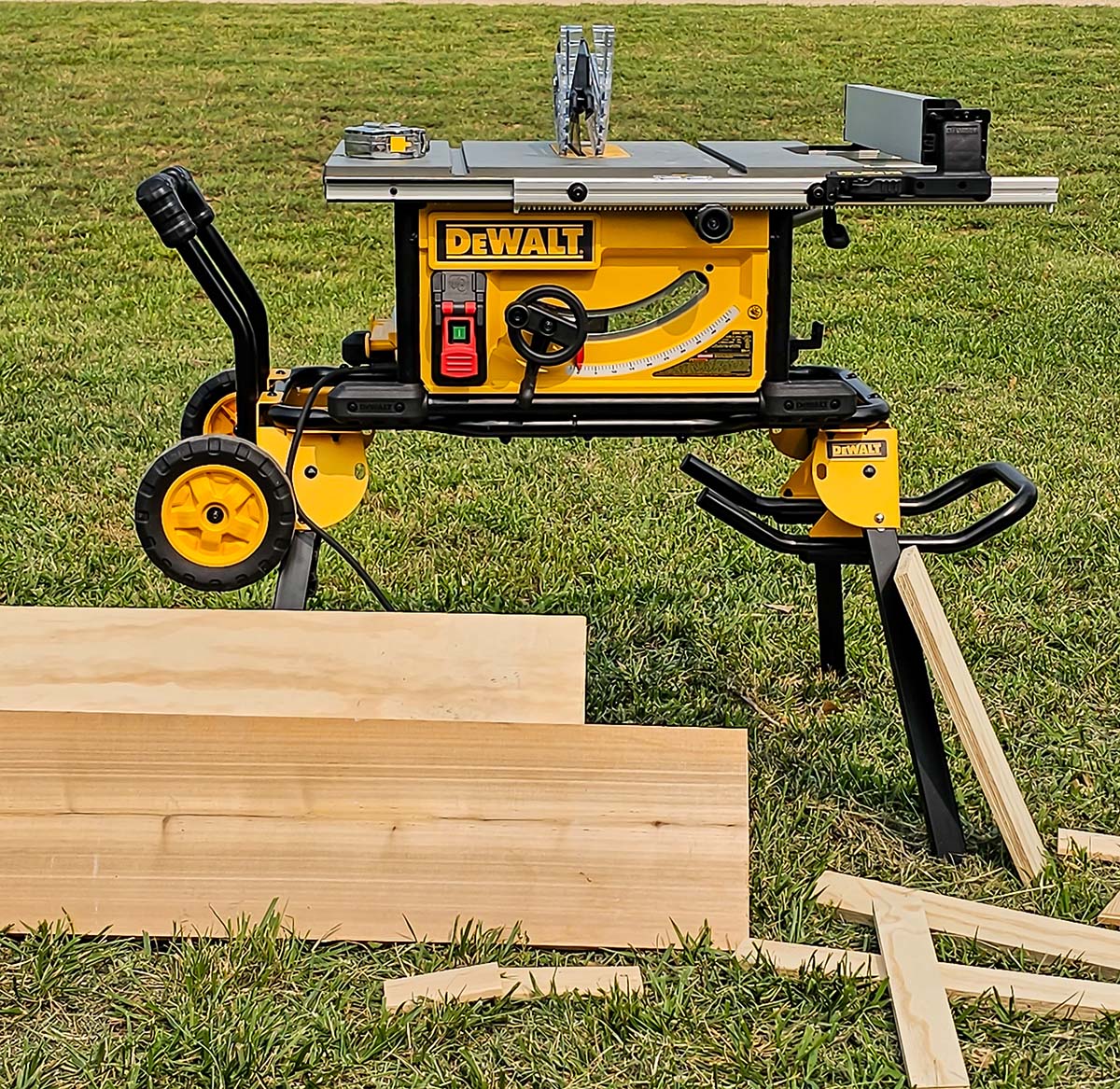

We may earn revenue from the products available on this page and participate in affiliate programs. Learn More ›
The popularity of table saws stems from their unparalleled ability to cut through materials with accuracy and ease, serving as the primary saw in countless construction and woodworking projects. As a leading authority in power tool manufacturing, DeWalt has carved its reputation by consistently delivering top-notch tools that meet the demands of professionals and DIYers. The DeWalt DWE7491RS 10-inch table saw is right up there with the best portable table saws on the market.
I tested several high-quality portable table saws on the jobsite and in my workshop—ripping sheets of plywood and making crosscuts, beveled cuts, and angled cuts. The DeWalt 10-inch saw emerged as a standout, taking the top overall spot in our lineup of the best table saws.
It’s not perfect, but it’s pretty darned close. Ahead, find out how the DWE7491RS performed when making various cuts on plywood and hardwood materials, and see why this 10-inch table saw may very well be a game changer in the world of woodworking tools.
DeWalt 10-Inch Table Saw: At a Glance
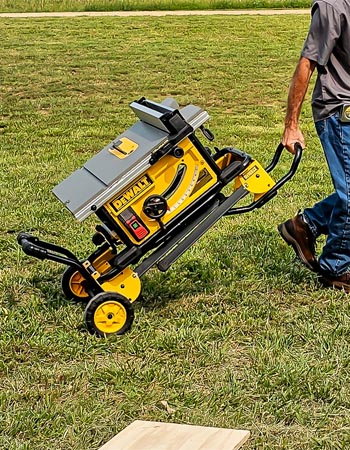
Rating: 9.5/10
SPECS
- Type: Jobsite (portable)
- Rip capacity: 32.5 inches
- Bevel capacity: 57 degrees
- Weight: 90 pounds
- Model number: DWE7491RS
PROS
- The saw made smooth, square, and accurate cuts right out of the box without requiring any adjustment
- Ergonomic control and accessory placement—start button, bevel, and fence adjustments are all located in easy-to-access spots
- The extended 32.5-inch rip capacity allows users to cut large sheet materials on the jobsite
- Blade-height adjustment makes it easy to raise or lower the blade
- Blade-changing wrenches and push stick are easy to access since they’re stored on the tool body
- Included dust port can attach to a shop-type vacuum hose to reduce airborne sawdust
- Portable rolling stand features 4-point base for added stability
- High-quality materials increase the tool’s overall longevity and durability
CONS
- There’s a very slight wobble in the fence when it’s adjusted to maximum extension
- Blade-guard assembly is chunky; although this is a common issue with all table saws, leave it on for safety purposes
- Leg-folding process is time-consuming since legs fold under one at a time, but the trade-off of this configuration is increased tool stability
Get the DeWalt 10-inch table saw at:
What is the DeWalt 10-inch table saw?
The DeWalt 10-inch table saw, model DWE7491RS, represents the peak of precision and innovation in wood-cutting equipment. What distinguishes the DWE7491RS from other portable table saws is the tool’s seamless integration of portability, power, and precision.
With a 15-amp motor, the DeWalt saw delivered top-notch cutting performance, smoothly ripping through several types and thicknesses of sheet materials. The extendable 32.5-inch fence has a flip-down foot that supports the outer edge of wider sheet materials and provides stability when cutting.
In general, portable table saws are designed for cutting smaller materials because unlike a shop saw, they don’t come with a large table, which is necessary for supporting wide materials. Still, with its 32.5-inch rip capacity, the DeWalt saw makes it possible to cut larger sheets without running back and forth to the workshop. This is a game changer, and DeWalt successfully pulls it off by providing a relatively heavy saw body (90 pounds) and four-point legs for stability yet putting the saw on a collapsible rolling stand, which makes it portable. While it’s not strictly a compact table saw, I would classify it as semi-compact.
To top it off, the DeWalt portable table saw made smooth, square, and accurate cuts—right out of the box. Unlike some table saws that arrive a little out of square and require adjustment before cutting, the DWE7491RS was ready to start cutting as soon as I assembled it.
Also important are its well-placed controls, which are all located within easy reach. This means the user doesn’t have to walk around the tool to reach anything. The on/off switch, depth adjustment, bevel adjustment, and fence adjustment are all on the front of the tool. The push stick stores on the side—and once I learned its location, I could reach for it without looking.
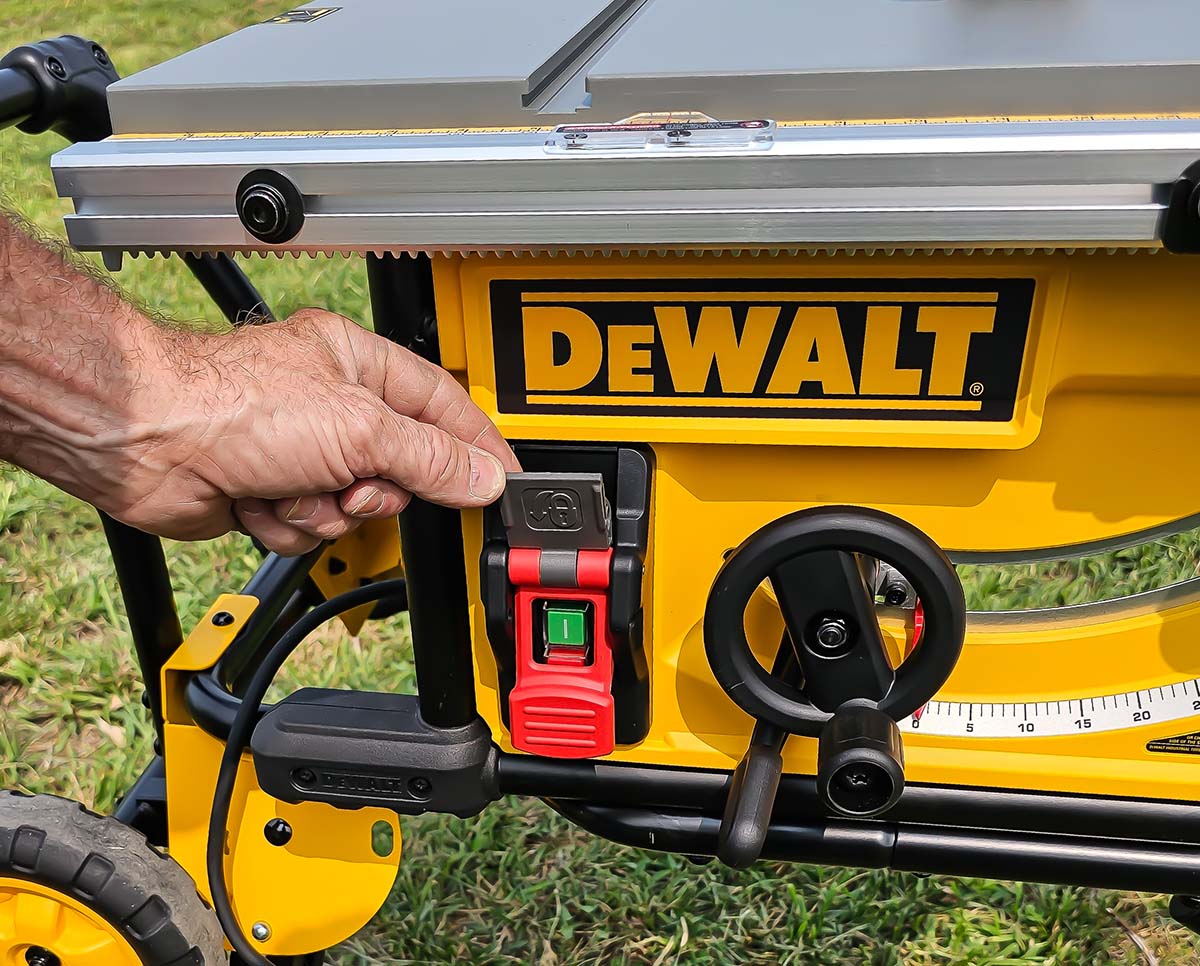
How easy is the DeWalt table saw (and stand) to assemble?
Assembling the DeWalt table saw took some time. While completing the saw body (attaching the blade, riving knife, and blade guard) was a straightforward process, putting together the collapsible rolling stand was more complicated because all the parts came separately and had to be assembled. The manufacturer includes wrenches for assembly, but using those would have taken even longer. Instead, I used ratcheting wrenches to speed up the process.
However, there’s a trade-off for the complicated assembly—enhanced stability. Every leg on the DeWalt stand moves separately, unlike other rolling stands that feature legs connected by bars. Because each leg on the DeWalt is independent, I adjusted them individually to sit solidly on uneven ground. Plus, each leg flares out slightly, which offers added assurance from tipping.
Assembling the entire saw and stand took about an hour, so allow ample time for the process.
How well does the DeWalt table saw perform cutting tasks?
In my hands-on tests, the DeWalt 10-inch table saw excelled in making straight, accurate, square cuts—without my needing to adjust it. However, I might have lucked out with the one I tested because it’s not unusual for table saws to arrive needing some adjustment before being able to cut.
I used standard guidelines to determine whether the fence was square with the table by checking to see if the fence aligned with the miter gauge grooves in the table. It was perfectly aligned. Had it not been, I would have tweaked the fence by adjusting the screws that attach the fence to the sliding rails.
My next step was determining whether the fence aligned with the blade. This is a test trim carpenters always perform before cutting—it involves using a tape measure and measuring from the tip of a blade tooth to the fence and then rotating the blade backward and measuring again from the same tooth to the fence. For the most precise cuts, these two measurements should be identical. Fortunately, they were, and without my needing to adjust the fence.
I then made several cuts on plywood and hardwood. This saw comes with a 24-tooth combo blade that I found well suited for basic cutting. However, I would upgrade the blade to one with more teeth, such as the DeWalt 80-tooth blade, if I needed a smoother cut edge.
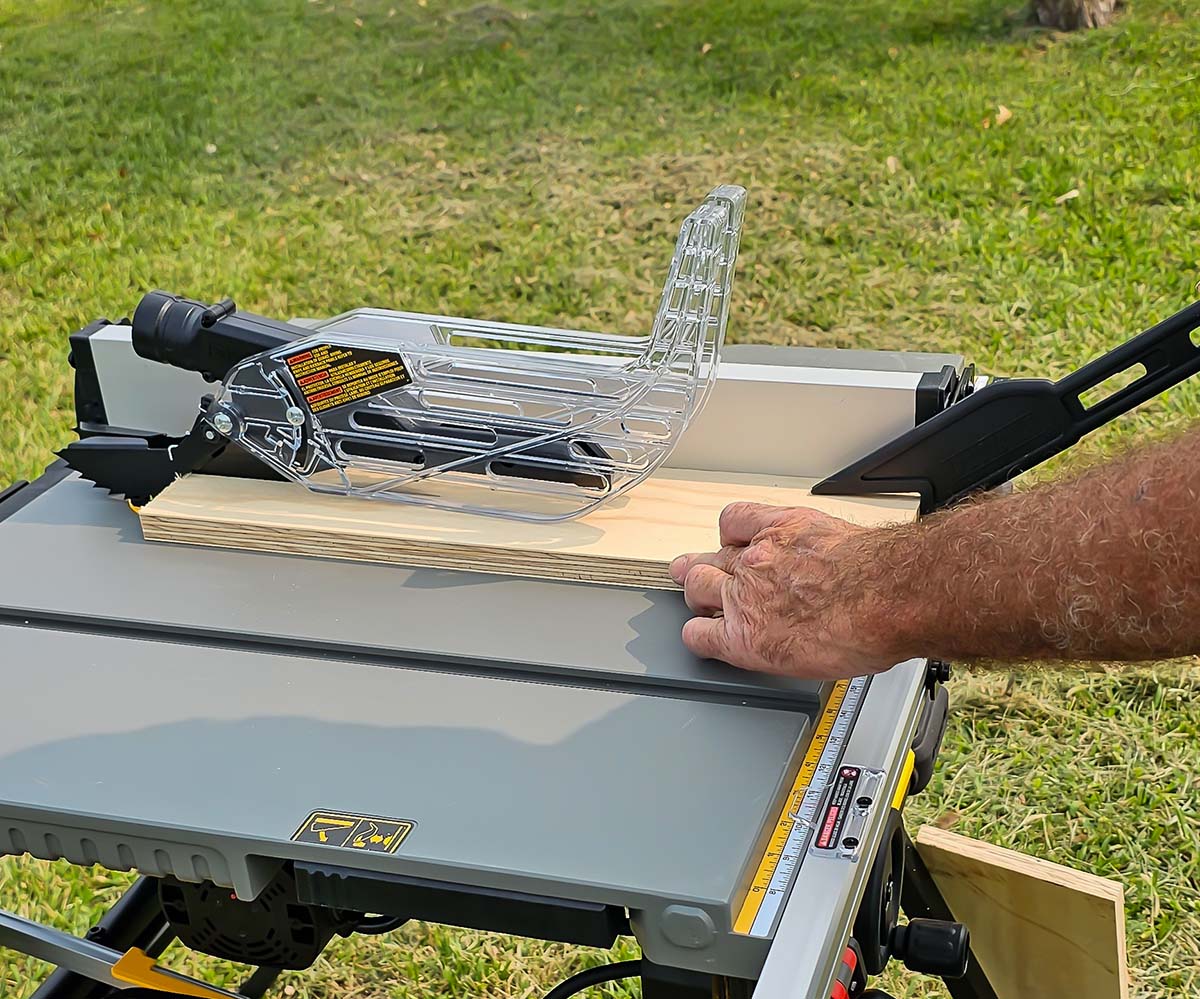
What safety features does the DeWalt table saw offer?
The DeWalt table saw prioritizes user safety through several well-engineered features, making it a suitable table saw for beginners.
- Shark fin-style riving knife: Positioned behind the blade, the riving knife prevents cut pieces from binding, which can lead to kickback. This feature ensures smoother, safer cuts by minimizing the risk of sudden material movement.
- Blade-guard system: The saw comes equipped with a blade guard that covers the cutting area, shielding users from direct contact with the blade during operation. This guard also reduces the potential for debris to be thrown outward.
- Flip-cover power button: The power button is designed with a flip-cover mechanism that adds an extra layer of security. This feature ensures that the blade can only be activated deliberately, preventing accidental starts.
- Push stick: The included push stick is a valuable safety tool, especially when users are working with narrow pieces that would otherwise require placing their hands too near the spinning blade.
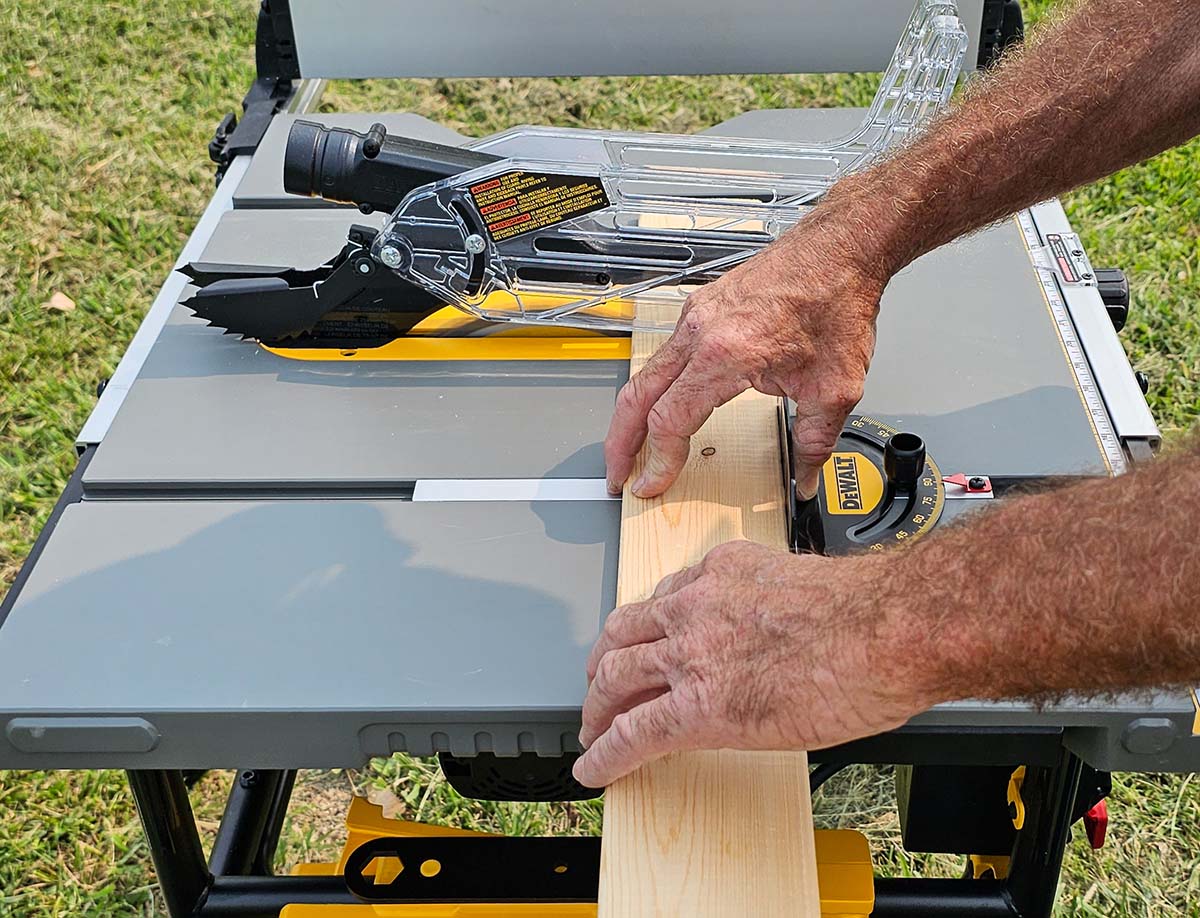
Should you buy the DeWalt 10-inch table saw?
The decision to invest in the DeWalt 10-inch table saw hinges on your woodworking needs and priorities. The DeWalt table saw is a compelling choice if you’re a professional craftsman or a woodworking enthusiast seeking a powerful and precise tool with exceptional cutting performance, stability, and portability.
Its built-in rack and pinion fence system, ergonomic controls, and safety features, such as the riving knife and power button flip cover, help provide a seamless and secure woodworking experience.
This saw particularly shines for those who prioritize accuracy and efficiency. The trustworthiness of its measurements, out-of-the-box cutting performance, and robust construction make it an appealing option for those dedicated to achieving top-tier results in their projects.
However, if you are on a strict budget and don’t need the added precision this table saw offers (primarily for finish carpentry), more affordable alternatives are available. While the DeWalt table saw justifies its higher cost (between $475 and $650) with a sturdy stand, superior stability, and thoughtful safety measures, users looking for a basic tool might find other options that fulfill their requirements for less than $400.
Where to Buy the DeWalt 10-Inch Table Saw
Get the DeWalt 10-inch table saw at:
Meet the Tester
Glenda Taylor is a product tester and writer specializing in the construction, remodeling, and real estate industries. She and her husband own a general contracting company, and Taylor is experienced in both residential and commercial building applications. She tests a wide range of power tools as well as other home improvement, household, and lawn-and-garden products.
